Sometimes it’s the parking that threatens my state of calm. Then there’s construction blocking the ramp forcing me to maneuver my daughter’s wheelchair off the curb backwards onto a busy two way street. Always it is the moment when I have to restrain my daughter as the nurse draws blood. Laying my torso across Luisa’s, pinning down her hands with mine, my resolve wavers. I begin to question my decision to enroll her in an experimental drug trial. As the needle goes in her purple vein, I whisper in her ear, “I’m sorry. I know this hurts. This medicine is going to help. YOU are helping, Luisa. YOU are doing brave things.” A message for my heart as well.
Our Experience in an Experimental Drug Trial
Currently we are in Week Three of an experimental drug trial that aims to alleviate the symptoms of Rett Syndrome, a rare, severe neurological disease my daughter was diagnosed with in 2014 at 20 months of age. It might seem odd that I used the word “we” instead of “she” at the beginning of that last sentence. But I need you to understand this truth: drug trials are a commitment for the entire family, not just the patient. Drug trials are much more than adding an extra medication to your child’s daily routine. For caregivers, they require time off work for all-day appointments where your child undergoes numerous tests while you fill out detailed questionnaires about their current health and symptoms. Each trial may require six to eight different appointments ranging from a few hours in length to long days of six or more hours at the hospital. If you do not live near a research center you will need to travel to the experimental drug site and stay at a hotel with your child, who may or may not sleep well away from home. You will leave the doctor’s office with a diary for meticulous recording of your child’s eating habits, medication dosage times, and behaviors. The questionnaires, rating scales, and diary entries will require hours of the caregiver’s time.
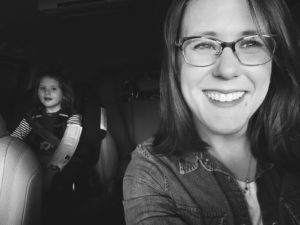
In a previous drug trial, Luisa had to wear a complicated bodysuit under her clothes to measure breathing patterns and heart rate. Our current drug trial does not require such high zoot garments but does pose other inconveniences. Luisa, always picky with her drinking habits, has rejected the drug’s taste. I plead with her to swallow each milliliter.
This particular drug has proved promising in our Rett Syndrome community. While taking the drug, girls once unable to purposefully use their hands for their constant wringing and tapping (Rett Syndrome hand stereotypes) are suddenly able to hold a pencil, draw a circle. There are reports of girls speaking words after years of alternating silence and screaming. Reports of a steadier gait. Longer attention to tasks. Improved breathing patterns. So with these promising reports in mind we dispense pink liquid in a syringe, praying for improvement in our girl too.
We had our longest appointment two weeks ago, before our state had gone into COVID-19 precautions. This appointment consisted of a morning exam, followed by a lunch break, and then an afternoon exam. The morning exam included urine samples, EKGs, and a blood draw. Luisa has a reduced ability to process pain but this did not keep her from kicking and screaming through the morning’s blood draw. The panic at being restrained was evident in her eyes. Forcibly restraining your child feels entirely unnatural, so I mentally coached myself through the task. It was over in only a few minutes. After a brief neurological exam we took a break for lunch.
During our lunch break we left the clinic to traverse the numerous walkways leading to the over-packed hospital cafeteria. It was in the second corridor that Luisa finally broke down. She was exhausted from the morning exam, over stimulated and overwhelmed. I wheeled the chair to the side of the walkway and lifted my angry, screaming seven-year-old daughter from her chair. I sat down on a bench, my back to a long window that looked out on downtown Birmingham, wet with steady rain. I positioned Luisa on my lap facing me and allowed her to scream and cry and throw her head down on my chest in frustration. After awhile she ceased her protests, laid her head on my shoulder, and fell asleep.
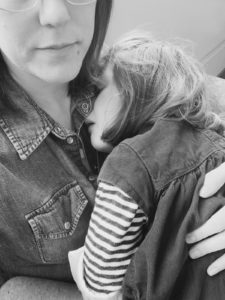
It was from this place on the bench that I looked up to see a piece of artwork hung on the wall at the end of the corridor. It was a quilt made up of brightly colored hexagon patches. Stitched over the top layer of the quilt was a black line drawing of a mother cradling an infant; just as I was cradling Luisa in my lap. Life imitating art. Or perhaps art imitating life because parents have cradled their children this way since the beginning of time — carrying them in our arms to receive nourishment. Carrying them into new, unexpected places, holding them until they gather the courage to venture away from our safe arms. It struck me as I sat on the bench between clinic and hospital cafeteria that my life as a special needs mother would mirror the line drawing on the quilt far longer than I had once anticipated, when disability was an abstract term, not a living / breathing reality in my life. Looking down at my exhausted child, cradled in my arms, I wondered why?
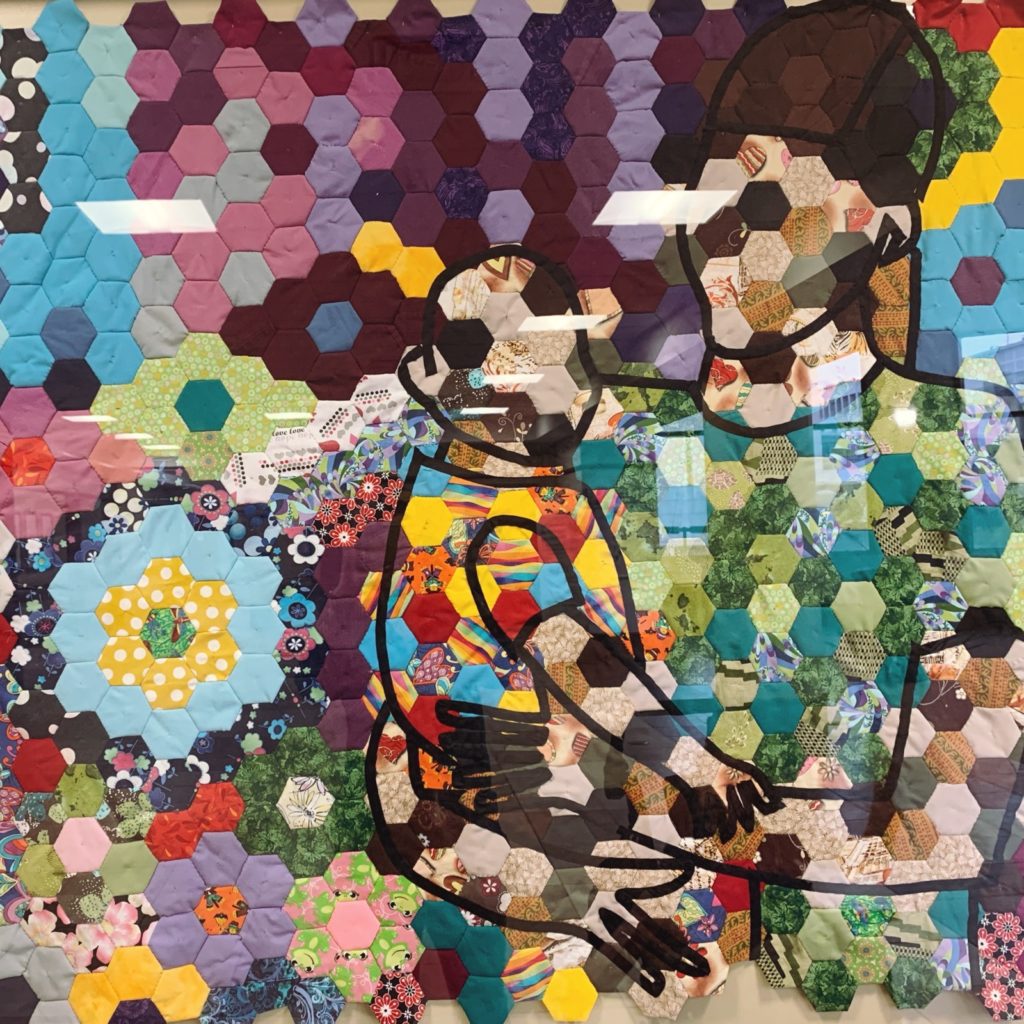
Why We Participate
Why endure? Why keep carrying her into a voluntary pharmaceutical trial when tears and exhaustion are part of the package? Why keep carrying her only to lay her on an exam table, draw her blood to be studied?
Why?
Because the mother in me honors the mother in you. You — the mother receiving the diagnosis for your daughter today. Who is asking the question, “What is there to be done?” Who is hearing in response, “No treatment. No cure.”
Why?
Because my daughter qualifies for these trials while others do not. Her heart is healthy, her age meets the criteria. If those who can do something refuse, where does that leave future generations? I will not turn my back, allowing others to take our place, then line up to receive the drug when it is finally approved. If I can help today, I will.
Why?
Because I know the heart of the universal mother in that quilt. Mothers are a force to be reckoned with. We will do anything for our children.
Why?
Because I would give anything to hear her speak again. I would give anything to ease her suffering.
We All Sacrifice for the Greater Good of the Community
It was a short twenty minutes before Luisa began to stir on my lap. I transferred her to the wheelchair before continuing our trek to the cafeteria. Pushing her chair further down the corridor I passed the quilts, pausing to examine them further. To my left were elevators that go up to the Labor and Delivery Rooms where mothers, weary and drained, cradle their newborn babies — where I cradled my Luisa seven years ago. I imagine a few of those babies, like my Luisa, hold secrets in their DNA that, once revealed, will break their mothers’ hearts. Two floors below those Labor and Delivery Rooms, Luisa and I are doing what those mothers and babies cannot yet do — we are working towards solutions. We are offering hope.
Two weeks after this long exam, we find ourselves in a totally different world. Luisa is still participating in the drug trial, even amongst the fear of COVID-19. Our family is practicing social distancing and isolation to prevent the spread of COVID-19, a virus that threatens the most vulnerable, including children like Luisa.
Reading posts on Facebook and Instagram, I see that black-line drawing on the quilt played out in real life as mothers and fathers gather their children close, cradle them near, all for the greater good of the community. In this way we honor one another. We honor the vulnerable among us, the children with compromised immunity, the elderly, the ill. We sacrifice for the greater good.
We must pull ourselves in. Cradle close. Protect our community. Protect the vulnerable. Protect my Luisa.
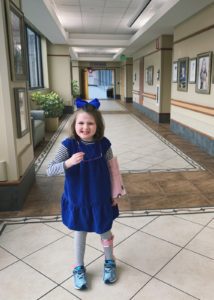




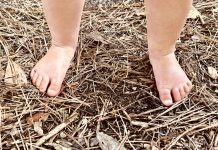
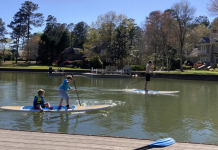






As always, poignantly beautiful Sarah. Love sweet Luisa, you and the other members of your family that so lovingly support her with your all.
Love you Jennifer! Thank you for your prayers and encouraging words!
This is beautiful Sarah.
Thanks Holly! Luisa sure misses you!
Sarah,
Thank you for opening this window into your world You paint wonderful and insightful pictures with your words. Our minds are taught and our hearts touched. We will be praying that this trial and your efforts will bring about positive results for Luisa and the many others dealing with Rhett.
Thank you for your prayers and encouragement Kathryn! I hope you and your family are staying safe and healthy during this time.
Sarah, you write so eloquently and beautifully. I wish I had the words to express our journey these past 2 1/2 years. Not nearly the same journey as you have traveled and lived but the same in some respects. We too are hoping to help other generations. We knew this trial offers hope for children with his same diagnosis but also adults who have something that goes awry in their genetics that produce a childhood cancer in not just a young adult or middle aged adult but an adult older than they have seen with this cancer. A rapidly growing cancer, one if left untreated is capable of taking over your entire lungs within a months time. So here we have found ourselves in Texas at MDAnderson away from everyone we know, a city we have lived the better part of our lives, late 70’s and early 80’s and moving in less than 5 days time, packing up our entire life without a permanent place to live, in hopes of not only giving Lynn, me some glimmer of hope, but also future generations. In order to get into the trial they had to redo his previous two biopsies and his oncologist asked before the biopsy could they take samples for their research team to trial different drugs on his tumor, he never had to think, his answer was an immediate, “absolutely”. When he 1st got the diagnosis, his words to me were not for himself but, “but I have so much more that I can give to my patients!” A cardiac anesthesiologists who absolutely loved what he did in his career thought of those patients to come also, those still left to help. So in that response regarding taking those extra samples, he never thought of what that could do to help him, keep him alive, it was for those to come, those children 1st, then for those adults with a childhood cancer that is rampant unless kept in check by some vicious drugs that do unspeakable things to ones body. The isolation from friends, family, grandchildren over the past 2 1/2 years and now states and many miles away from any family and no end in sight for the ability to see anyone with the effects of the drugs on your immune system but now even worse the fear of contracting the Coronavirus with absolute neutrophil counts in the double digits, we isolate ourselves from the world….and tomorrow, he is isolated alone because after then, I can no longer come into the hospital. But we remind ourselves, we do this, HE does this for those to come 1st and foremost.
Sarah, you are an amazing woman, mother, wife, friend and I wish and pray for you and Louisa and your family promising results in Louisa’s trial. My very best to you and your dear family always. Cindy Simons
Oh wow Cindy! What a journey you have been on. The bravery and self-sacrifice is amazing. Lynn is making a difference for future generations. What an incredible thing to do during a time it would be so easy to focus on self. I will be praying for you both during your time in Houston. I’m so very thankful that our lives intersected on River Run.
Comments are closed.